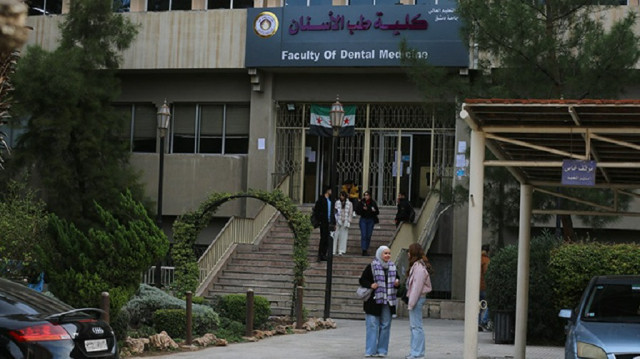
'Under Assad's regime, people were not allowed to do anything or speak about anything, even political topics,' Syrian graduate told Anadolu
- 'I can feel that students are now more open. They participate, they give their own opinions'
Universities in Syria, which had been closed since Dec. 8 due to uncertainty following the fall of the Bashar al-Assad regime, resumed education on Monday.
After suspending education for two weeks on Dec. 8, universities remained closed due to the Christmas holiday. Following a break of approximately one month, education activities have resumed, with many students returning to campus to take their final exams.
Students and teachers, excited to return to their universities, shared their experiences and emotions about the recent events in Syria with Anadolu.
- 'A new era of freedom, expression'
Reem Al Zohaili, a graduate of Damascus University's Faculty of Architecture and Higher Institute of Languages, who now works as a teacher, expressed the joy and relief felt after the regime's downfall.
"Under Assad's regime, people were not allowed to do anything or speak about anything, even political topics. Now, people are free to speak and act as they wish -- it feels like being released from prison," she said.
Highlighting the newfound freedom, Zohaili noted: "In the past, I used to push my students to participate in the class to give opinions about things, even though we never talk about politics."
"I can feel that students are now more open. They participate, they give their own opinions," she stressed.
Zohaili recounted the oppressive environment during the regime, where discussing political matters often led to imprisonment.
She revealed that some students were expelled and jailed in 2014 and 2015 for criticizing the regime, and many lost their lives in bombings targeting schools.
- 'No one expected regime to fall'
Jouman Msouti, an English teacher at the Higher Institute of Languages and a graduate of Damascus University, said the regime's fall came as a shock to many.
"Something happened that no one thought possible -- the regime fell. No one could have imagined it," she said.
Msouti expressed optimism for Syria's future, stating that while establishing a new system would take time, the opportunity to build a peaceful, unified country had arrived. She also called on Syrians abroad to return and aid in the rebuilding process.
Addressing Western perceptions of Syrians, Msouti said: "We are not terrorists. We are normal people who want to live our lives." She emphasized the need for basic services and modern universities, criticizing the dehumanization of Eastern peoples, especially in conflicts like Gaza.
- 'People are happier now'
Lana Channais, a second-year dentistry student at Damascus University, described how life had improved after the Baath regime's fall.
"People are happier. Many have been released from prisons, which is a good thing because many were jailed simply for their ideas," she said.
She expressed support for the new administration, noting its efforts to ensure public safety. Channais stressed the importance of better education and facilities for Syrians.
Suleiman Selloum, another second-year dentistry student, highlighted the importance of rebuilding Syria as a united nation.
"We must build a free Syria without fear or hesitation," he said, calling for respect for minority rights and unity among all Syrians.
Selloum expressed his commitment to staying in Syria to serve his country. "I don't plan to go abroad. I want to stay here and help," he concluded.

